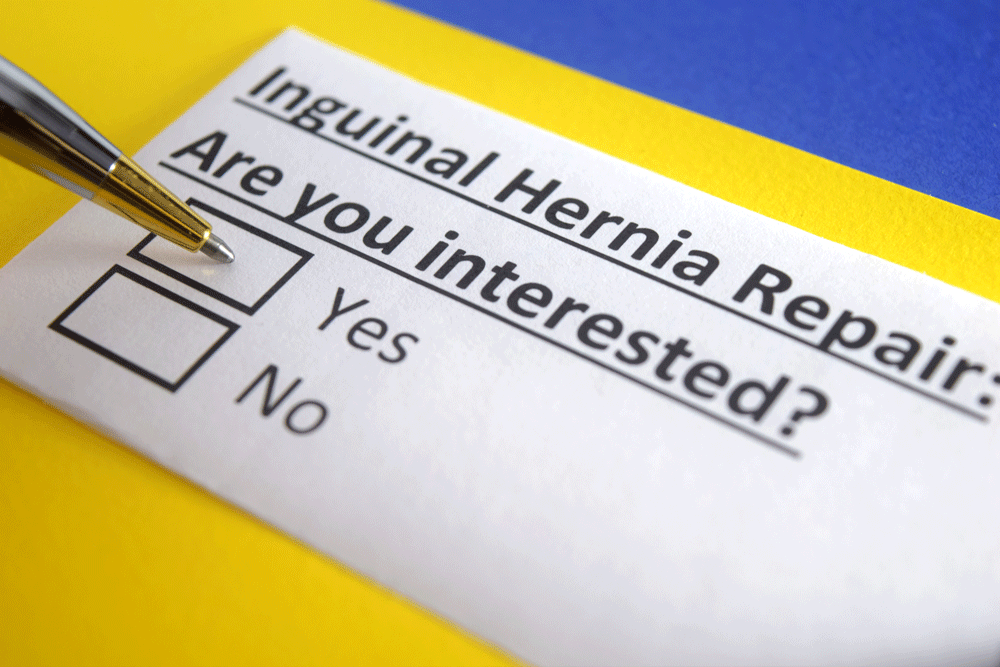Inguinal Hernia - Dubai Hernia Surgery Clinic at DRHC
Inguinal hernia is one of the most common types of hernias and is known to account for 2/3 of hernia conditions. Since more than 90% of hernia patients are known to be men, the condition of Inguinal hernia is also more common within the male population. It has two types: unilateral or bilateral
What exactly is an Inguinal Hernia?
An inguinal hernia is a condition wherein patients experience a bulge or protrusion in the groin or scrotum area. This bulge occurs when fatty or intestinal tissue pushes through the inguinal canal, which is located at the base of the abdomen. This bulge can be painful, especially when the patient coughs, bends over, or lifts a heavy object. The weak area of the inguinal canal is usually at the site of the passage of the spermatic cord to the scrotum in males, or the ligament supporting the uterus in females.
Read: How Laparoscopic Inguinal Hernia Repair Surgery is performed
Causes of Inguinal Hernia
- One of the major causes of an inguinal hernia is an opening in the groin muscle wall, which does not close as it is supposed to after birth.
- This leads to the creation of a weak spot in the belly muscle, and any extra pressure applied to this area often leads to the development of the Hernia condition.
- The condition can occur within a short time after birth or can remain dormant for many years before it becomes evident much later in life.
Read: Latest techniques of Laparoscopic hernia repair
Symptoms:
Many patients do not experience any symptoms of the condition except for a noticeable bulge in the pubic or groin area. However, the other common symptoms that are generally associated with an inguinal hernia include the following.
- A burning or aching sensation around the bulge
- Pain or discomfort in the groin, especially while coughing or bending over
- A sensation of heaviness or dragging in the groin area
- Sharp pain along with swelling of the scrotum
- Weakness or pressure in the groin area
In most cases, the patients are able to gently push the bulge back into the abdomen, and it might even reduce in size and gradually disappear on its own when they lie down.
In some cases, an incarcerated inguinal hernia occurs when the tissue becomes stuck in the groin and isn’t reducible, which means it can’t be pushed back into place. Strangulated Inguinal Hernias are a more serious medical condition because they mean that the intestinal tissue has its blood flow cut off. Its Symptoms include:
- severe pain
- fever
- rough, swollen, reddish bulging
- nausea or vomiting
- Inability to defecate or pass gas
(Visit the emergency room immediately when these symptoms occur)
Read: How to do Laparoscopic Hernia Repair?
Risk Factors:
- Gender: Inguinal Hernias are 8 times more common in males than females, making up 5% of male newborns.
- Age: the older we are, the more our muscles become.
- Ethnic group: It's more common in white people.
- Genetic predisposition: It's likely to happen to people with a family history of having an Inguinal Hernia.
- Chronic cough: That's caused by smoking and respiratory diseases.
- Chronic constipation: This leads to straining too much to empty the bowel.
- Pregnancy
- Stressful physical activity

Read: 20 Q&A about Laparoscopic Hernia Repair
Diagnosis:
An Inguinal Hernia is diagnosed by an experienced Hernia Specialist through:
- Careful clinical examination
- Abdominal Ultrasound Scan to confirm the diagnosis
- Abdominal CT Scan in some rare cases.
Read: Experience and Vision of Laparoscopic Hernia Repair
Treatment:
Abdominal wall hernias, including Inguinal Hernias, cannot improve over time and cannot be treated with pharmaceuticals, so surgery is the treatment of choice.
A hernia specialist advises conducting a Laparoscopic Hernia surgery with a mesh, where the abdomen is insufflated with gas (CO2), an Endoscope and surgical instruments are inserted through small holes in the abdominal wall, then release the hernial sack away from the muscles of the abdominal wall, and finally close the defect in the muscles and support it with a mesh.
*Find out more about Laparoscopic Hernia Surgery Cost*
.png?width=281&height=59&name=bookanappointment%20(1).png)
Our Hernia Surgery Clinic at DRHC provides the best Laparoscopic Surgeon in Dubai, with wide experience in Laparoscopic Hernia Surgery, Inguinal Hernia Surgery, Umbilical Hernia Surgery, Hiatal Hernia Surgery, Hernia repair with mesh, and much more. To book an Appointment, please call +97142798200.





.png?width=281&height=59&name=bookanappointment%20(1).png)
.webp?width=1080&height=1080&name=Doctor%20background%20For%20Website%20Dr.%20Fadi%20Nageeb%2009%20(1).webp)
.webp?width=1080&height=1080&name=Doctor%20background%20For%20Website%20Dr%20Abdul%20Majeed%20Khalid%20%2002%20(1).webp)



